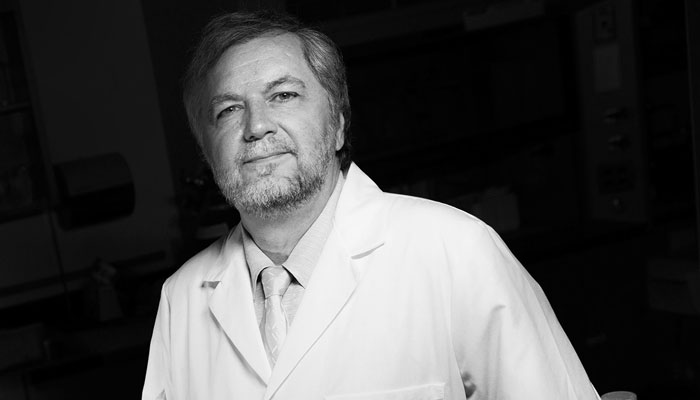For prostate cancer patients, a potential treatment with fewer side effects
By Jan Jarvis

Prostate cancer patients who have lifesaving therapy to lower testosterone often survive the disease, only to face debilitating neurological symptoms of which hot flushes are the most common.
Medications are available to address these hot flushes (also known as hot flashes), but they come with side effects that men often find intolerable due to the feminizing effects of these drugs.
Now an innovative treatment that is free of these devastating side effects is being developed by a UNT Health Science Center researcher with the help of a $1 million grant from the National Cancer Institute.
For men who suffer hot flushes as a result of androgen deprivation therapy (ADT), a possible new treatment offers hope with fewer side effects, said Laszlo Prokai, PhD, ScD, Professor in the Center for Neuroscience Discovery and the Robert A. Welch Chair in Biochemistry at UNTHSC.
“Our medication under development promises to maintain quality of life for many prostate cancer patients while receiving lifesaving therapy that stops their tumor from growing,” Dr. Prokai said. “Our experimental drug candidate aims at restoring the balance lost due to ADT.”
About 161,360 new cases of prostate cancer will be diagnosed in 2017. It is the second most prevalent cancer in men and an estimated one in seven will develop the disease in his lifetime. Use of ADT has increased markedly in the United States, where one-third of the 2 million prostate cancer survivors are receiving it. ADT is effective in improving survival rates when it is administered relatively early in the course of prostate carcinoma.
But the benefits of ADT are offset by debilitating symptoms similar to those seen in surgically and naturally menopausal women. Hot flushes, depression, anxiety, cognitive impairment, and sexual dysfunction can occur.
Hot flushes, the most prominent symptom experienced with ADT, can cause sleep disturbances resulting in fatigue, irritability, depression, and forgetfulness, as well as acute physical discomfort. Most patients who experience hot flushes on ADT continue to exhibit these symptoms for as long as they are receiving the therapy.
The most effective prescribed drug is a synthetic version of the female hormone estrogen, which has serious side effects, Dr. Prokai said. It can cause enlargement of breasts, which can lead to physical and psychological discomfort and negatively affect the patient’s compliance to treatment. There are particularly high risks for deep vein thrombosis, and subsequent pulmonary embolism.
The drug candidate under development could improve the quality of life without side effects for the many men who are diagnosed with the disease and receiving the lifesaving ADT, Dr. Prokai said.
“After it is taken by the patient, our experimental drug candidate remains inactive until it reaches the brain,” Dr. Prokai said. “Hence, we abolish the unwanted side effects.”



![Uyen Sa Nguyen Scaled[58]](https://www.unthsc.edu/newsroom/wp-content/uploads/sites/16/Uyen-Sa-Nguyen-scaled58-145x175.jpg)

Social media